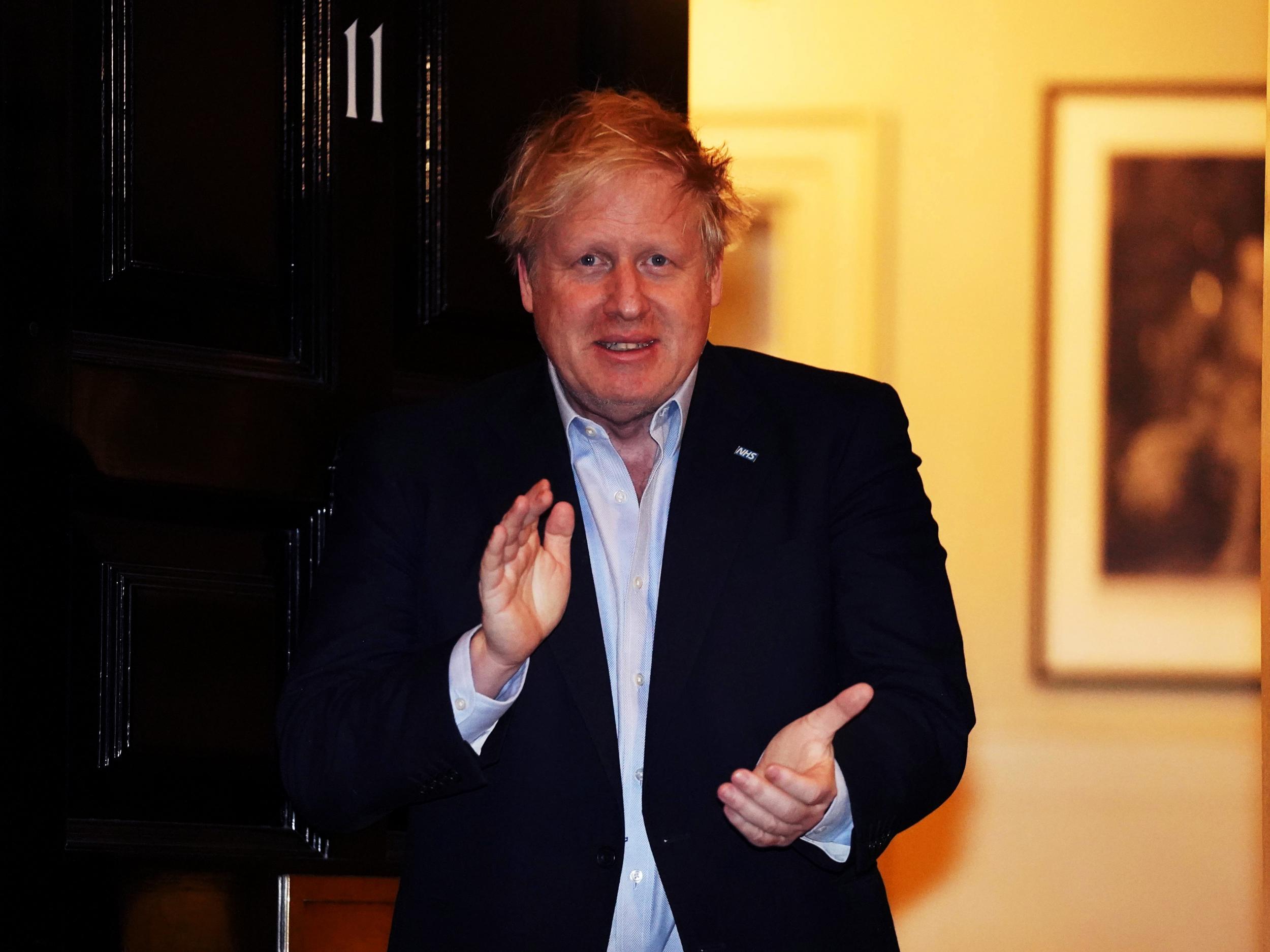Putting the NHS on a pedestal helps no one – least of all the health service itself
The more praise that is heaped on it, writes Mary Dejevsky, the less reason the government will have to reform and properly fund this dysfunctional institution


It has become as much of a national hallmark as the morale-boosting singing from balconies in Italy. Each Thursday evening, the #ClapForCarers becomes louder and more enthusiastic. Even where I am, in a part of London with as many offices as housing and far more flats than houses, more and more people have come out of their doorways, opened their windows and switched up their radios and televisions to take part in this national moment.
And nothing wrong with that, nothing at all. It makes for a heartwarming expression of collective appreciation for “our NHS”. Today’s British cities have not, in my experience, been founts of community sentiment, royal weddings and jubilees notwithstanding. Maybe this could change.
Nor is there the slightest doubt that NHS and care workers deserve the gratitude flooding in their direction, including so eloquently from the prime minister. As was tragically seen in Italy, where more than 60 medics have died, doctors, nurses, paramedics and carers may be called upon to put their lives on the line, and not just during this pandemic. For all the justified criticism of war talk, they do indeed work on the “frontlines”.
What is more, if the UK emerges from coronavirus without exhausting its supply of beds, especially in intensive care, this must be accounted a huge success; a vindication not just of the lockdown, but of “our NHS”. The nightmare for ministers would surely have been scenes from British cities akin to those from northern Italy, where desperately ill patients and dead bodies lined corridors, there were not enough ventilators, and army lorries were requisitioned as mass hearses.
This is not to neglect some of the nightmares that have come to pass. There are the restrictions, including isolation procedures, that took away from families what Matt Hancock called their last chance to “say goodbye” and the funerals with no mourners allowed to attend (some of that is now being rectified). There are the patients who went into hospital for other reasons and contracted Covid-19 while there (no figures are as yet forthcoming). And there is the death toll that is edging up to the 20,000 the government’s chief scientific adviser, Sir Patrick Vallance, said would be a “good outcome”, at a time when it did not sound like a good outcome at all.
But – and there will be a lot of people out there who will object to the introduction of any “but” – I find the way in which “our NHS” is being placed on a pedestal, its staff lauded as “saints” and “angels” “going above and beyond” – as, how shall I put this, hard to take. When this crisis is over, it risks being counterproductive.
One of the lesser problems with all the adulation is that it risks leaving others with claims to recognition out in the cold. The almost 1 million carers are one such group; then you have all the “key workers”, underpaid and underappreciated until this unprecedented emergency struck. So #ClapForCarers – and why not? – has broadened every week.
I want to concentrate, though, on the NHS, because of how it has once again become the object of near universal adoration – or at least near-universal adoration, because there have been a few individuals who have dared to be voices in the wilderness. One doctor dared to write to a national newspaper describing the NHS as a “hapless institution” that was “not fit for purpose”. In the following days, of course, he was metaphorically howled down.
What is entirely true is that the NHS has – as emergency services tend to in a crisis – risen to the occasion. The number of former staff who answered the call to return was impressive, as was the number who volunteered for the new Nightingale hospitals, and the (highly unusual) willingness of many to cross rigid professional demarcation lines.

That said, however, the way the service is being lauded, you might think it was a charitable enterprise rather than a million-strong professional organisation. My personal experience – including with my husband, who had Parkinson’s – is that there is much that is excellent and inspiring about the NHS. But you can also encounter poor treatment, lamentable facilities and amateurism. Not all hospital staff are saints. They are individuals, many with a sense of vocation, who are paid to do a job.
But it is to the two claims most frequently heard that I want to return. Those are that the NHS is a) unique and b) the best in the world.
The NHS may well be unique in the emotion that is channelled in its direction and the place it occupies in people’s hearts (or some of them). But the UK is not unique among developed countries in having a state health service, or even one that is free, or nearly free, at the point of delivery; this is the norm across Europe. It is the United States that is the exception.
How Europe’s health services are organised and funded varies. Many are insurance-based, as ours once sort of was. Some use private and or charitable hospitals; some have private ambulance services; some levy a small fee for seeing a GP. Many include services such as dentistry, ophthalmology and even social care that are largely means-tested in the UK.
What separates most European countries from the UK, however, is the extent to which the NHS is a political and emotional issue, and how equality is seen as a virtue. When Boris Johnson was in hospital, it was stressed that he was in an ordinary ward and treated no differently from any one else. Imagine if he had “gone private” as Margaret Thatcher did. That distinction mostly does not arise on the continent because of insurance; in the UK, by contrast, public attitudes seem to have become more egalitarian over time rather than less.
As for the boast, rarely contested, that the NHS is “the best in the world”, you have only to ask some of the Europeans – including east and central Europeans – who work in the UK and choose to return home for medical services. It is true that in its 2017 survey, the Commonwealth Fund (an American charity, nothing to do with the Commonwealth as we know it) placed the NHS top – but this accolade was solely for cost-effectiveness.

In numbers of doctors and beds, but crucially in outcomes for very many conditions, the UK lagged behind almost every other European country. And while value for money and equal access may be virtues in themselves, I tend to think that outcomes are pretty crucial, especially when you are talking about a health service. The NHS also has a history of reluctance to acknowledge mistakes: while France paid compensation for the contaminated blood scandal years ago, those NHS patients whose lives were blighted are still testifying before a lumbering inquiry.
The truth is that the NHS may be doing an utterly heroic job during this crisis. But there were already many ways in which it could have learned from its European counterparts before, and afterwards that room for improvement will still be there. The coronavirus also exposed particular flaws: inadequate reserves of kit, a hopeless ordering and distribution system that took weeks to get into any sort of shape, a poor record on hospital-acquired infections, a need for more flexible working, poorly used or unsuited accommodation, and a relatively poor level of overall public health.
The risk is now that the more lavish the compliments showered upon the NHS, the less anyone in the organisation or in government, at any level, will see any reason to change. The workings of this whole vast institution will be set in stone, with a laudatory inscription and – if some get their way – the George Medal to boot. We have seen complacency set in before, after an idealised version of the NHS – complete with the beds, the uniforms and the innocence of the 1950s – played a starring role in the Opening Ceremony of the 2012 Olympics. That must not happen again.
Join our commenting forum
Join thought-provoking conversations, follow other Independent readers and see their replies
Comments
Bookmark popover
Removed from bookmarks